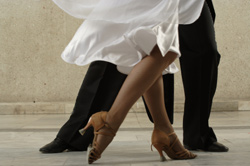This is How Positive Change Happens…
The Criticism – Defense Dance
 Most of the time, when we perceive we have been criticized, we react with defensiveness. Sometimes, our defensiveness includes an attack on or a criticism of the other person. So then, they get defensive back. On and on this hellish dance can go. In some relationships, it can go on for years. In others, it is short lived, either because we part ways negatively, or we start to hold ourselves accountable and take the challenge to learn to communicate more effectively. When I work with people in couples counselling, dealing with the critcism-defense dance is almost always a key part of the work.
Most of the time, when we perceive we have been criticized, we react with defensiveness. Sometimes, our defensiveness includes an attack on or a criticism of the other person. So then, they get defensive back. On and on this hellish dance can go. In some relationships, it can go on for years. In others, it is short lived, either because we part ways negatively, or we start to hold ourselves accountable and take the challenge to learn to communicate more effectively. When I work with people in couples counselling, dealing with the critcism-defense dance is almost always a key part of the work.
I know if you’re reading this you care about learning to communicate more effectively. I encourage you to practice with the following phrases:
I hear criticism. Can you re-phrase that?
OR
I hear criticism. Can you speak to me more gently?
It takes awareness, honesty, and courage to be able to state this to someone. Initially, it may feel very uncomfortable to state this because you’ll be getting out of the usual retaliation/defensive mode. Or maybe you have gotten into the habit of pretending you don’t feel criticized (or hurt) when you do.
When you practice saying one of the above phrases, you may get a reaction that goes something like this:
“Well, I’m not criticizing you…” or “It’s not my intention to criticize you, I’m just saying…”. These are defensive reactions.The fact is that it doesn’t matter whether the person was actually criticizing you or not; what matters most is that you hear it (or experience it) as a criticism. Coming from a place of compassion, subjective experience is what’s most important.
If need be, state the same exact phrase again, “I hear criticism. Can you re-phrase it?“. If the person refuses, you may choose to say something like, “I need a break from this conversation“. If the person accepts your feedback about hearing criticism, and maybe says, “I’m sorry” and then tries to talk to you with more care, I encourage you to smile and say, “Thank you“.
When we rise to the challenge of speaking more directly and honestly to our experience in conversations with our loved ones, we are caring for ourselves and our relationships better. We can choose to let ourselves do a new dance even if we feel awkward when we’re first learning. Soon enough, the new dance will feel more smooth and maybe even fun.
If you need help … I am here for you. Please book an appointment.

